#Adam Clayton Powell Jr.
Text
youtube
RUSTIN | Official Teaser Trailer
The architect of 1963’s momentous March on Washington, Bayard Rustin was one of the greatest activists and organizers the world has ever known. He challenged authority, never apologized for who he was, what he believed, or who he desired. And he did not back down. He made history, and in turn, he was forgotten. Directed by DGA award and five-time Tony award winner George C. Wolfe and starring Emmy award winner Colman Domingo, Rustin shines a long overdue spotlight on the extraordinary man who, alongside giants like the Reverend Martin Luther King Jr., Adam Clayton Powell Jr., and Ella Baker, dared to imagine a different world, and inspired a movement in a march toward freedom.
Produced by Academy award winner Bruce Cohen, Higher Ground's Tonia Davis and George C. Wolfe.
#Rustin#Bayard Rustin#Colman Domingo#George C. Wolfe#Chris Rock#Glynn Turman#Jeffrey Wright#Audra McDonald#movie trailer#Dr. Martin Luther King Jr#Adam Clayton Powell Jr.#Ella Baker#Youtube
50 notes
·
View notes
Text
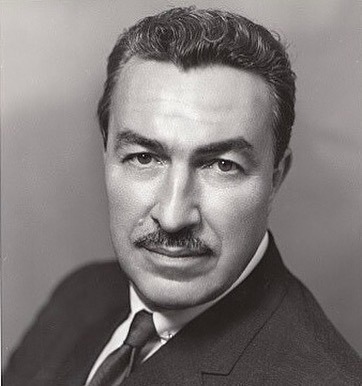
Today In History
Adam Clayton Powell, Jr., the first Black Congressman from Harlem, New York was an unapologetic activist who left his mark on Congress during his 12 terms in the House of Representatives. He was born in New Haven, CT, on this date November 29, 1908.
Viewed by his Harlem constituents as a dedicated crusader for civil rights, Powell earned the loyalty and respect of many African Americans with his confrontational approach to racial discrimination. Never one to shun the spotlight, the outspoken New York minister and politician—regarded as an irritant by many of his congressional colleagues—relished his position as a spokesperson for the advancement of African–American rights.
“Keep the faith, baby; spread it gently and walk together, children,” was a legendary slogan of the charismatic and flamboyant Representative.
CARTER™️ Magazine
#carter magazine#carter#historyandhiphop365#wherehistoryandhiphopmeet#history#cartermagazine#today in history#staywoke#blackhistory#blackhistorymonth#Adam Clayton Powell jr
77 notes
·
View notes
Text
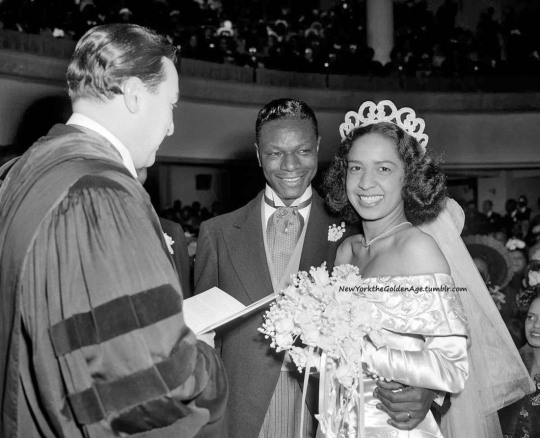
Nat King Cole and singer Maria Hawkins Ellington were married in the Abyssinian Baptist Church in Harlem, March 28, 1948. Performing the ceremony was the Rev. Adam Clayton Powell Jr. (D-NY), Congressman from Harlem. Historians said the $17,500 wedding and reception was the most elaborate in Harlem since 1923.
Photo: Jacob Harris for the AP via the St. Louis Post-Dispatch
#vintage New York#1940s#vintage Harlem#Jacob Harris#wedding#Maria Hawkins Ellington#Nat King Cole#Adam Clayton Powell#March 28#28 March#Mar. 28#Abyssinian Baptist Church#lavish wedding
102 notes
·
View notes
Text
Rev. Adam Clayton Powell Jr. What's In Your Hand speech (1967)
11 notes
·
View notes
Text
By Stephen Millies
The House of Representatives voted 234-188 to censure Rashida Tlaib — its only Palestinian member — for condemning the U.S. / Israeli genocide in Gaza. Over 10,000 Palestinians have been murdered so far in Gaza by U.S.-made and U.S.-paid-for bombs and shells. Four thousand have been children.
The Nov. 7 resolution is as racist as was the expulsion of Harlem Congressperson Adam Clayton Powell Jr. in 1967.
#Rashida Tlaib#Palestinians#Congress#racism#imperialism#GazaGenocide#FreePalestine#Adam Clayton Powell#Israel#occupation#apartheid#Struggle La Lucha
8 notes
·
View notes
Text

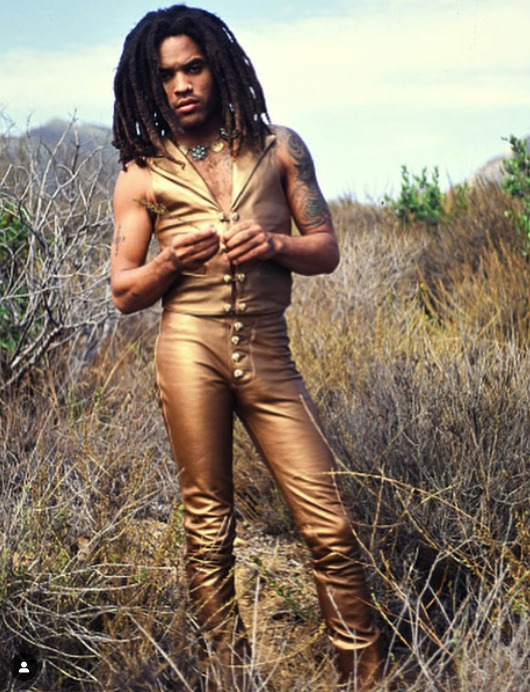
Bayard Rustin, one of the greatest activists and organizers the world has ever known, was all but erased from history for being an openly gay Black man. RUSTIN shines a long-overdue light on the extraordinary man who, alongside Reverend Martin Luther King Jr., Adam Clayton Powell Jr., and Ella Baker, dared to imagine a different world, inspiring a movement in a march toward freedom.
I was honoured when George C. Wolfe approached me to write a song inspired by Rustin for @rustinmovie. The movement he championed then is just as important today. We still have so much ground to cover. That’s how “Road To Freedom” was born. I hope you’re inspired by this film and song to come together with love.
@RustinMovie is available to watch on @Netflix now.
words from Lenny Kravitz
7 notes
·
View notes
Text
scans: Time magazine, October 22, 1945
World War 2 had ended a month and a half earlier and now everyone was trying to figure out what they were supposed to be doing in peacetime. (The advertisements still include a line saying “Buy War Bonds” at the bottom.) Let’s take a jaunt through this exciting time, where Time had a lot of political statements to make because so much was going on right then.
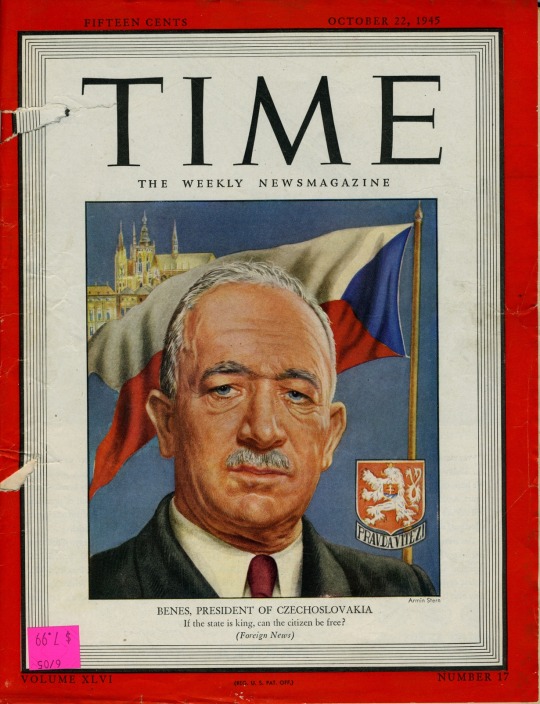
Czechoslovakia started in 1918. ceased existance under the Nazis in 1939 but Beneš maintained a government-in-exile, was restarted in 1945 once the war ended, and ceased existance for good in 1989.
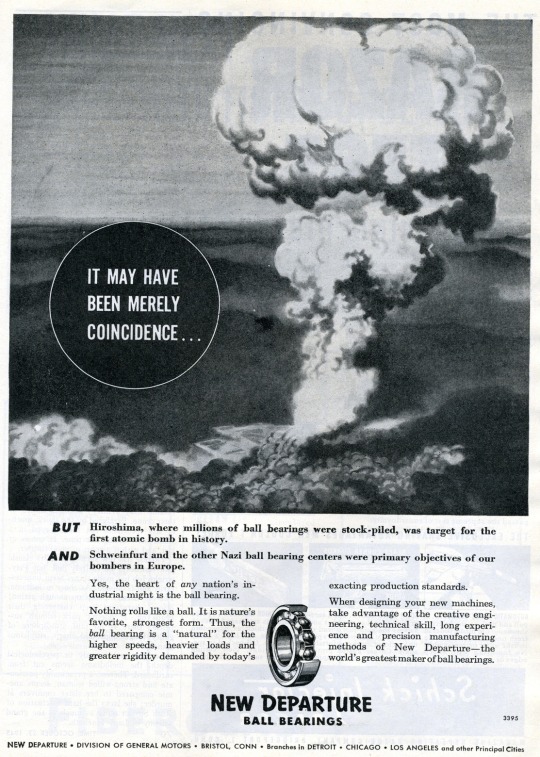
That’s right, we bombed Hiroshima because they had ball bearings. This is one of three advertisements by bearing makers.
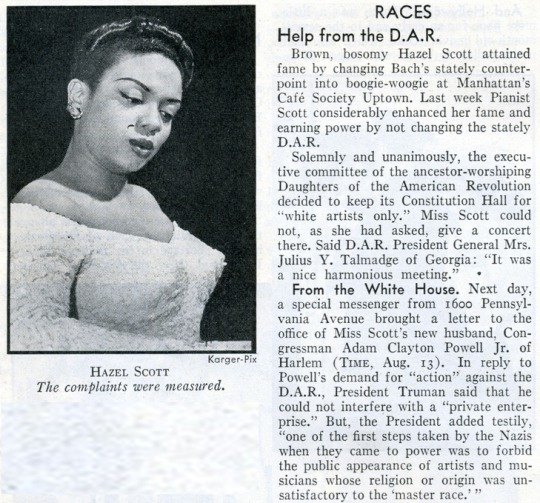
That time the Daughters of the American Revolution were unsurprisingly racist, and President Truman called them Nazis... but then his wife Bess had tea with the DAR, which pissed off Scott’s husband, US Representative Adam Clayton Powell, Jr. Scott got the last laugh when Representative Powell booked Carnegie Hall for her and the show was a huge success.

I will post the entire article soon. Some people are reading too much into the character and not doing enough reading of the comic strip itself. (Also, he claims that Wonder Woman is both a Nazi and a whore. Clearly Ong has a thing for either the soft-heroes of Marvel or the horror comics from Entertaining.)
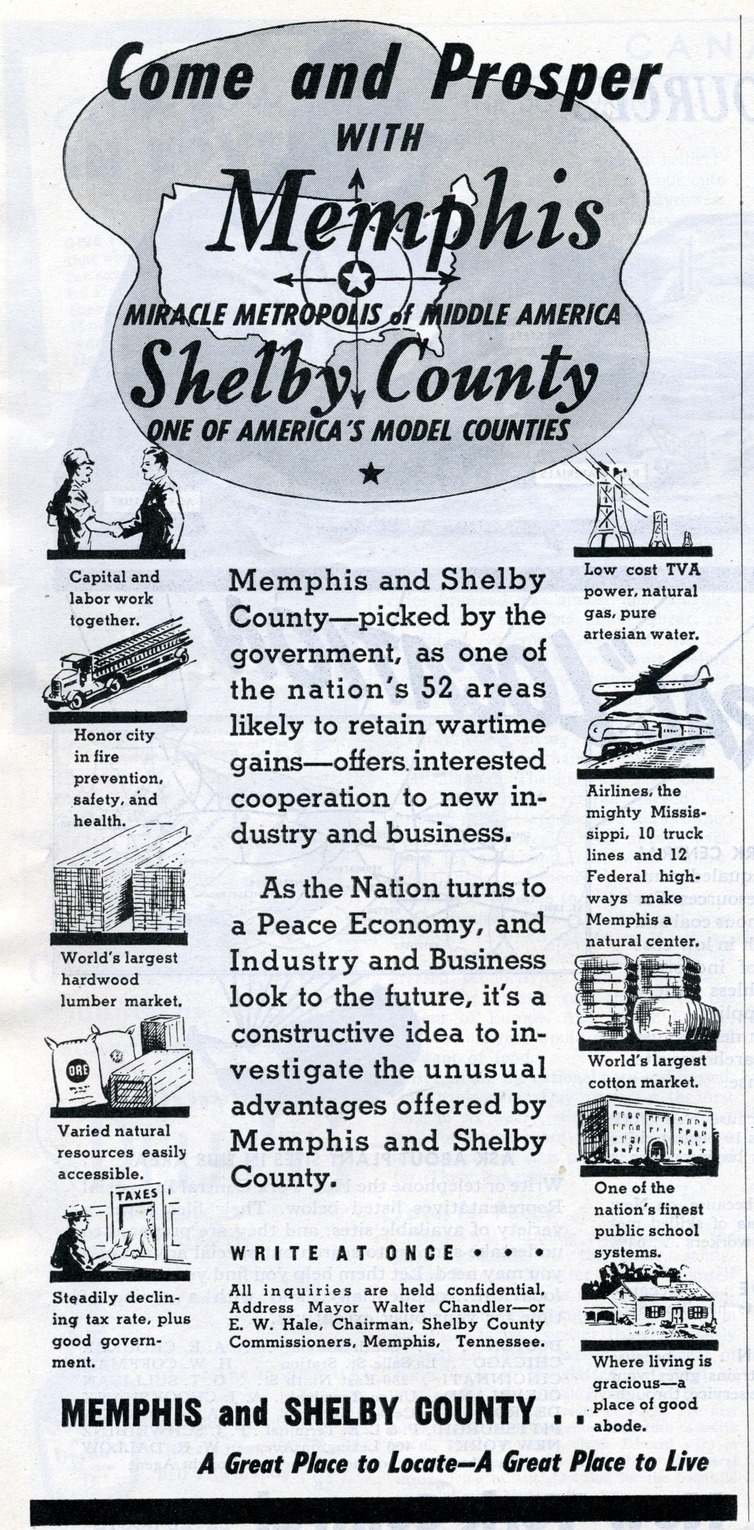
You’ve got to move to Memphis, that’s what I’ll do... There’s also a full-page ad for moving to Cleveland. “75 million customers within 500 miles!”
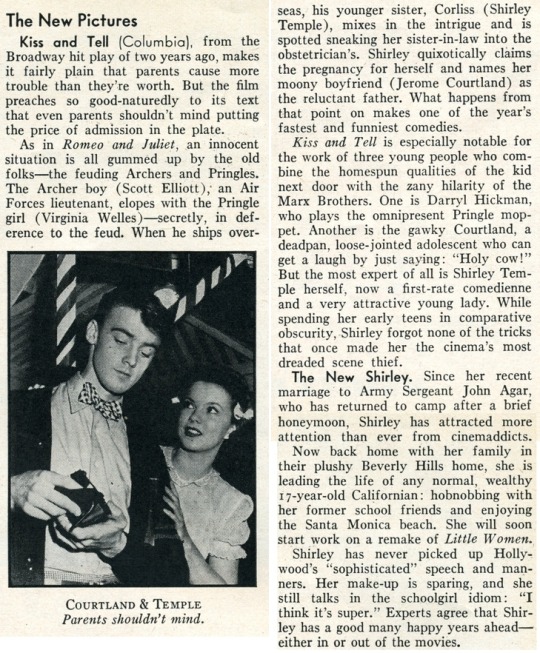
“Experts agree that Shirley [Temple] has a good many years ahead -- either in or out of the movies.” Mostly out since she did 8 more films over the next two(!!) years then mostly bowed out of Hollywood. Also, remember that in the 1940s, premarital sex was taboo so the premise of Temple’s character getting knocked up by her boyfriend was scandalous. Marriage at 17, as she had done, was not.
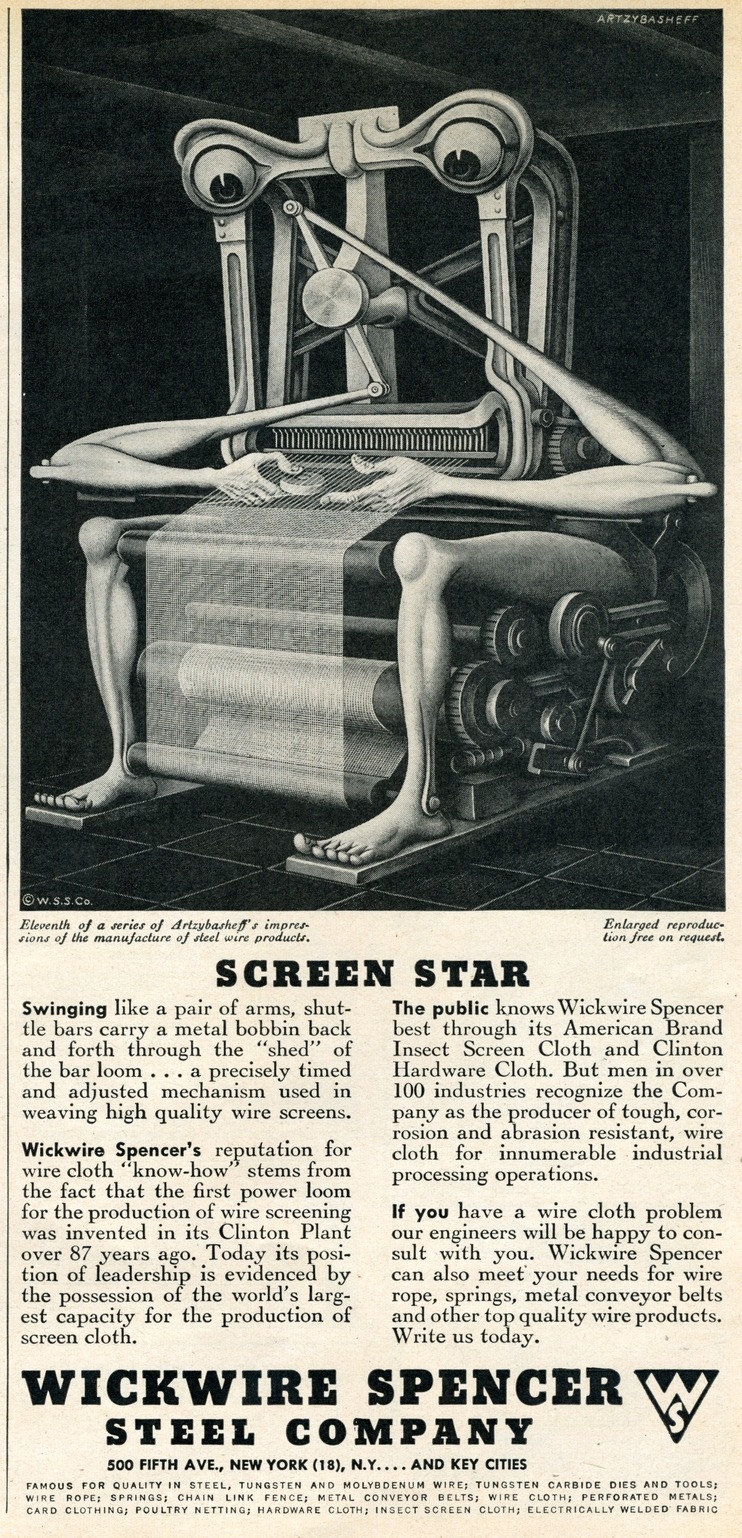
This guy.
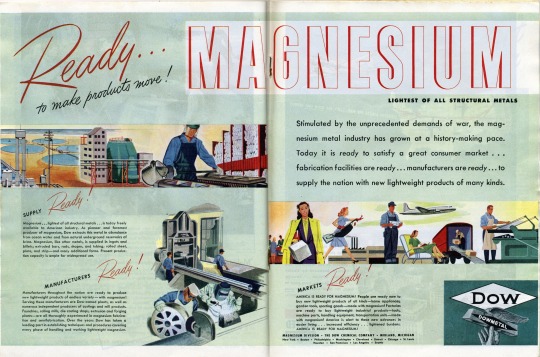
A two-page spread for magnesium. A decade later, the rave would be aluminum, and that particular metal is still with us.
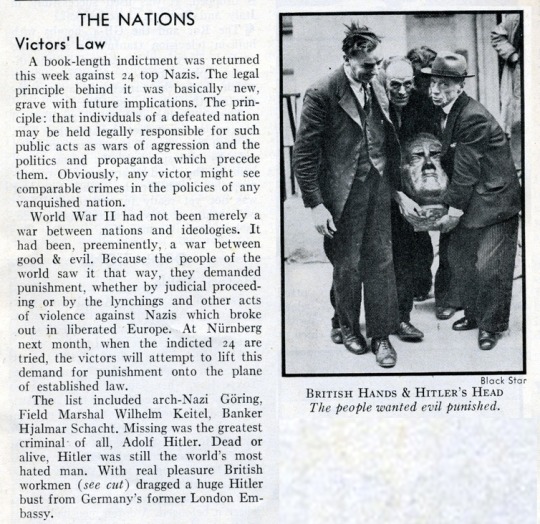
Heil (thppt!) Heil (thppt!) right in the Fuhrer’s face. The Nuremberg trials started on November 20 so things were going to stay interesting for a year.
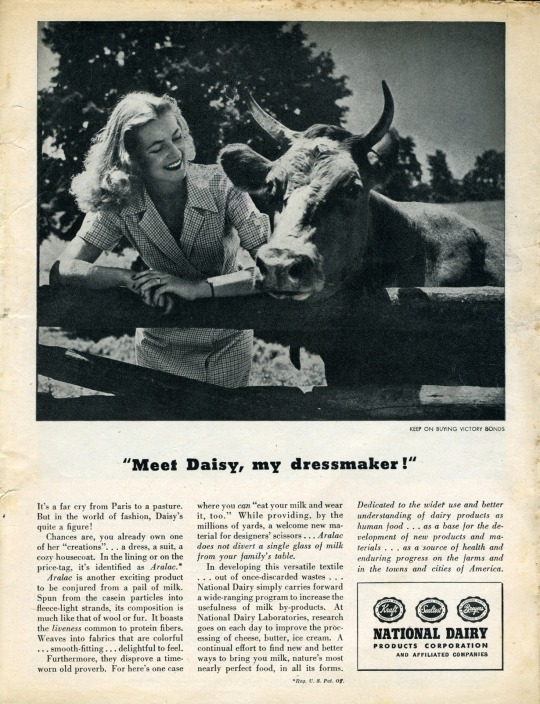
I’ve asked the purists: Aralac fiber, derived from the casein in milk -- “wool made from cheese” -- makes the clothing vegetarian but not vegan, and no cattle died to make that outfit.
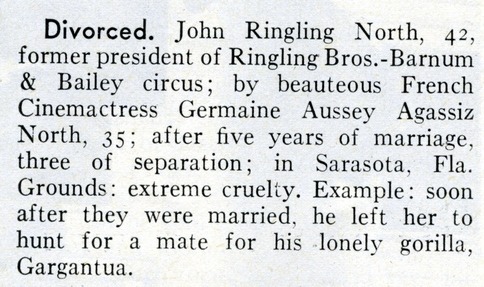
Lastly: You’ll have to click over to my typewriter blog to see the clunky post-war typewriter Smith-Corona was advertising (an Army office model), when what they really put on the market once they had unshelved all the parts they had stockpiled prior to the war (to make rifle firing pins for a spell) were some really stylish and handsome Silents, Sterlings, and Clippers.
12 notes
·
View notes
Text

Models Tuesday P. Brooks, Etta, an unidentified model, and Morgan (left to right) at a fashion show at the Adam Clayton Powell, Jr. State Office Building, wearing an unidentified designer, 1991.
10 notes
·
View notes
Photo
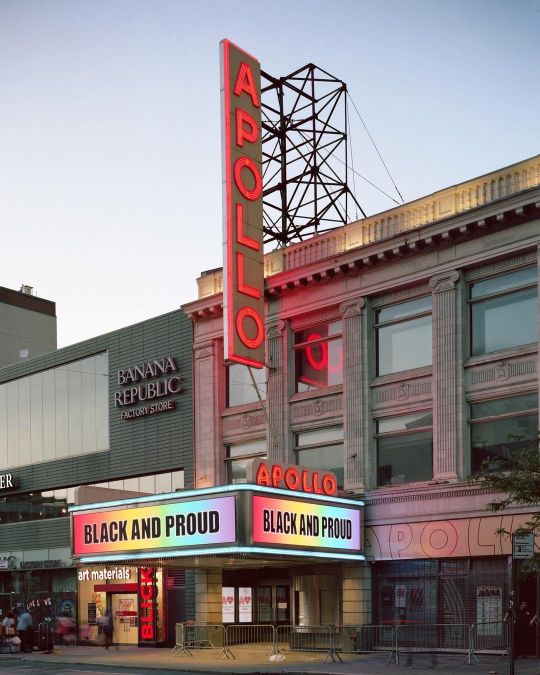
The Apollo Theater is a music hall located at 253 West 125th Street between Adam Clayton Powell Jr. Boulevard (Seventh Avenue) and Frederick Douglass Boulevard (Eighth Avenue) in Harlem. It is a noted venue for African-American performers, and is the home of Showtime at the Apollo, a nationally syndicated television variety show that showcased new talent, from 1987 to 2008, encompassing 1,093 episodes; the show was rebooted in 2018. The theater, which has a capacity of 1,506, opened in 1914 as Hurtig & Seamon's New Burlesque Theater and was designed by George Keister in the neo-Classical style. It became the Apollo on January 26, 1934, when it was opened to African American patrons – previously it had been a whites-only venue. In 1983, both the interior and exterior of the building were designated as New York City Landmarks, and the building was added to the National Register of Historic Places. It is estimated that 1.3 million people visit the Apollo every year. #africanhistory365 #africanexcellence https://www.instagram.com/p/Cn4X8aSL1Zt/?igshid=NGJjMDIxMWI=
2 notes
·
View notes
Text
Teens Exercise for Free at Planet Fitness This Summer
08 W. 125th Street (Frederick Douglass and Adam Clayton Powell Jr. Boulevards).
By Scott Etkin
Teenagers on the Upper West Side can work out for free at Planet Fitness gyms this summer. The chain’s national High School Summer Pass program is intended to give kids a way to stay active when school sports programs and after school activities are closed. It runs from today, May 16 to August 31.
“Especially here in New York City, when you see the violence, the gun violence on TV, in the news every day, it’s a great safe way to keep kids occupied in those summer months when they’re not in school,” said Dale Paden, Vice President of Marketing at a group that operates 80 Planet Fitness clubs inสลอตfour states.
2 notes
·
View notes
Text
🎨#ArtIsAWeapon #NewExhibit "Ethereal Essence: Portraits of the African Diaspora" opens tonight at @curtissjacobsgallery_harlem , 6PM-9PM.

📍Curtiss Jacobs Gallery
2075 Adam Clayton Powell Jr Blvd (7th Avenue) #Harlem #NYC
Reposted from @curtissjacobsgallery_harlem Join us on Friday April 19th, 2024 6pm - 9pm as we embark on a captivating journey into the soulful depths of the African Diaspora through mesmerizing portraiture. Ethereal Essence,” a remarkable group exhibition showcasing the exquisite works of five esteemed African artists.
Each artist skillfully captures the essence and elegance of their subjects, offering a glimpse into the rich tapestry of cultural heritage and individual narratives.
From bold strokes to delicate details, these portraits resonate with a timeless allure, inviting viewers to immerse themselves in the beauty and diversity of the African experience.
#ContemporaryArt
#ContemporaryAfricanArt
#BlackArt
#CurtissJacobsGallery
#ContemporaryPainting #MixedMedia #AfricanArtist
#CollectAfricanArt #NigerianArtist #HarlemGallery
#BlackOwnedGallery #BlackGirlArtGeeks
#Curtiss Jacobs Gallery#NewExhibit#BlackArt#BlackArtists#AfricanArtists#BlackGirlArtGeeks#ArtIsAWeapon#contemporary art#BlackOwnedGallery
0 notes
Link
Bir polis memuru New York'ta bir binanın önünde duruyor. — AFP/DosyaNew York City'deki yetkililer Pazar günü, Harlem'de bir barın önünde duran dört kişinin vurulduğunu, şüphelinin gruba ateş açtıktan sonrasında vaka yerinden kaçtığını bildirdi. Çatışma sabah saat 4 civarında Adam Clayton Powell Jr. Bulvarı üstündeki Just Lorraine's Place 2'de meydana geldi. Silahlı saldırgan sokaktaki kalabalığa ateş açtı. Bir NBC New York Raporda, yaralanan 4 yaralının yaşamsal tehlikesinin bulunmadığı açıklandı.Yetkililer, yaralıların tamamının adam bulunduğunu ve yaşlarının 21, 39 ve 46 bulunduğunu belirtti. Yetkililer, durumlarının tehlikeli sonuç olmadığını bildirdi.Saldırgan vakadan sonrasında özgür kaldı ve yaya olarak firar etti. Müfettişler kanıt bulmak için mahallede arama yapıyor.Ayrı bir gelişmede, Burnsville, Minnesota'daki yetkililer, aralarında bir sıhhat görevlisinin de bulunmuş olduğu minimum üç polis memurunun, aile içi sertlik raporları aldıktan sonrasında ölümcül şekilde vurulduğunu bildirdi.Vali Tim Walz üzüntüsünü dile getirerek kurbanların ailelerine destek verdi.Minnesota Cezai Soruşturma Bürosu'na (BCA) gore, tetikçi de ölüm sebebi açıklanmadan ölmüştü.Eski adı Twitter olan X'te gösterilen bir açıklamada Vali, yetkililerin "tehlikedeki bir ailenin çağrısına cevap verdiğini" söylemiş oldu.Ek olarak öteki görevlilerin de yaralandığını belirtti.Walz, X hakkında yapmış olduğu açıklamada, "İlk müdahale ekiplerimizin her gün yaptıkları cesareti ve fedakarlıkları asla hafife almamalıyız." dedi."Bugün, bu kamu çalışanlarının aileleri, mümkün bulunduğunu bildikleri sadece asla gelmeyeceğini umdukları çağrıyı aldılar. Kalbim o acılı ailelerle beraber; Minnesota Eyaleti, elimizden gelen her türlü desteği vermeye hazır. Bu, bizim için ağlatısal bir yitik. bizim devletimiz."
0 notes
Photo

Today In History Adam Clayton Powell, Jr., the first Black Congressman from Harlem, New York was an unapologetic activist who left his mark on Congress during his 12 terms in the House of Representatives. He was born in New Haven, CT, on this date November 29, 1908. Viewed by his Harlem constituents as a dedicated crusader for civil rights, Powell earned the loyalty and respect of many African Americans with his confrontational approach to racial discrimination. Never one to shun the spotlight, the outspoken New York minister and politician—regarded as an irritant by many of his congressional colleagues—relished his position as a spokesperson for the advancement of African–American rights. “Keep the faith, baby; spread it gently and walk together, children,” was a legendary slogan of the charismatic and flamboyant Representative. CARTER™️ Magazine carter-mag.com #wherehistoryandhiphopmeet #historyandhiphop365 #cartermagazine #carter #adamclaytonpowelljr #blackhistorymonth #blackhistory #history #staywoke #blacktwitter https://www.instagram.com/p/ClineiFud1i/?igshid=NGJjMDIxMWI=
#wherehistoryandhiphopmeet#historyandhiphop365#cartermagazine#carter#adamclaytonpowelljr#blackhistorymonth#blackhistory#history#staywoke#blacktwitter
50 notes
·
View notes
Photo

May 24, 1959: A mass picketing demonstration is in full swing before Mt. Sinai Hospital at 100th St. and Fifth Ave., as members of the Abyssinian Baptist Church join members of Local 1199 of the Retail Drug Employees Union on strike against the hospital. Adam Clayton Powell, Jr., congressman from Harlem, in clerical collar, called the demonstration "Operation Humanity." On Powell's right is Leon Davis, president of Local 1199, and on Davis's right is Joseph Overton, New York chairman of the NAACP.
Photo: Getty Images/Fine Art America
#New York#NYC#vintage New York#1950s#strike#Mt. Sinai Hospital#Adam Clayton Powell#unions#NAACP#Abyssinian Baptist Church
97 notes
·
View notes
Text
Rustin

Awards buzz first thrust George C. Wolfe’s biopic about U.S. civil rights activist Bayard Rustin, the openly homosexual (largely use this word and "gay" as the then common "labels") African American architect of the landmark 1963 March On Washington, onto my radar. What’s not to like, right? and onto my (Netflix) watchlist it went.
Plopping up after another biopic, the beautifully mounted but ultimately hollow Maestro, Rustin might have benefitted from a favorable comparison – both films examine the lives of queer men who in one way or another strived for social change in postwar America – not that Maestro even mentions Leonard Bernstein’s philanthropy and support of progressive causes like the Black Panthers, even if Tom Wolfe coined the term “radical chic” to question the sincerity of celebrity political activism, after attending a Bernstein benefit for the Panthers .
youtube
Thanks to Netflix’s algorithms and playback mode, the final strains of music from “Candide” accompanying Maestro’s end credits briskly segued into Branford Marsalis’ jazzy Rustin score. The film begins with onscreen text informing us that discrimination based upon race was declared unconstitional by the U.S. Supreme Court in 1953. This is followed by wordless horrific images of the humiliation African Americans (here primarily young women) had to endure from whites (largely male with the occasional hateful looking woman) when exercising their constitutional right to attend school. After the film’s title appears briefly, we hear offscreen “things have to change and they need to change now.” It’s 1960 and we witness various civil rights activists, including Martin Luther King (Aml Ameen) and Bayard Rustin (Colman Domingo), planning a non-violent demonstration at the Democratic Convention that summer. Threats of Gandhi-inspired civil disobedience in the 1940s successfully pressured the Roosevelt Administration into ending discrimination in the military and defense industries, so why not use this method again? Yet not all African American leaders are down: NAACP (National Association for the Advancement of Colored People) head Roy Wilkins (Chris Rock in an unusual serious role) thinks the movement should tread even more lightly to achieve its goals. Longtime Democratic New York City Congressman Adam Clayton Powell, Jr. (Jeffrey Wright), on the other hand, seems primarily angry about a movement he doesn’t control and worried about how a protest might affect his standing within the party. Clayton Powell leans on King to drop the idea and Rustin, too, while he’s at it, otherwise there will be rumors about just how tight King and his charismatic and effective advisor really are. The protest is called off; King reluctantly dumps his friend.
(The Obamas’ company Higher Ground executive produced the film; did Barack Obama think about his former pastor, Reverend Jeremiah Wright, with whom he severed ties during his first campaign after Wright spouted antisemitic statements and conspiracy theories? While, unlike the smear campaign against Rustin, Obama’s rupture with Wright was understandable, it might have caused considerable soul searching. Wright later somewhat toned down his rhetoric.)

Rustin finds himself in the political wilderness, living in New York, taking a unfulfilling job with a lefty nuclear disarmament NGO – an all-white joint with, as it turns out, a homophobic boss who claims he just wants to keep Rustin on the straight and narrow. Rustin enjoys the company of a younger white man - smart, sweet, devoted (at times to a fault) Tom Kahn (Gus Halper) and has a support system of accepting friends.
Soon, it’s 1963, and President Kennedy holds a televised speech promising further civil rights legislation. This is received with skepticism (civil rights were apparently not Kennedy’s top priority) which turns into outrage when that evening, images of particularly brutal police retaliation against demonstrators, including hosing down children, appear on TV. “Things have to change,” and this time, Rustin is determined to make that happen. He reaches out to labor activist (head of the Brotherhood of Sleeping Car Porters) A. Philip Randolph (Glynn Thurman) and floats the idea of a massive non-violent march, for “jobs and freedom,” on Washington. Randolph is game. Rustin and King reconcile. And so, with Randolph nominally the chief organizer and Rustin running the show in the background, they set out to recruit the other “Big Six” civil rights organizations (in addition to the Brotherhood the NAACP, SNCC - Student Nonviolent Coordinating Committee, CORE - Congress On Racial Equality, King’s Southern Christian Leadership Conference and the National Urban League) while Rustin sets up a tight logistics operation.

Rustin doesn’t always successfully avoid sentimental biopic clichés, but the film crackles with comic energy when it shows how the dedicated team, under Rustin, both drill sergeant and seducer, manages the nuts and bolts of organizing the march. How many narrative films walk audiences through political grunt work? - from first brainstorming sessions, fundraising for busses to bring demonstrators from around the country to and from Washington to securing food supplies (peanut butter and jelly trumps cheese sandwiches) and Rustin’s contrasting security meetings with the African American brotherhood within NYPD (open to non-violent, de-escalation tactics) and the all-white D.C. police force delegation (latently racist, overstepping boundaries, possibly in cahoots with the F.B.I.). One especially satisfying moment: Rustin, again under pressure and somewhat out of commission, gazes appreciatively at his team as they have become so self-motivated and professional that the well-oiled machine can practically run without him.
Before the big day rolls around, the NAACP still is hesitant unless compromises are made. One: no White House, the protest stays at the Mall (one of the funniest exchanges during the prep sequence shows Rustin asking how many people are needed to surround the White House – a volunteer thinks this is a joke set up before he conveys she better get right on this). And two: the event is shortened from two days to one – considering the messy logistics of tent accommodation and longer leaves of absence from work, maybe Wilkins was being sensible here?
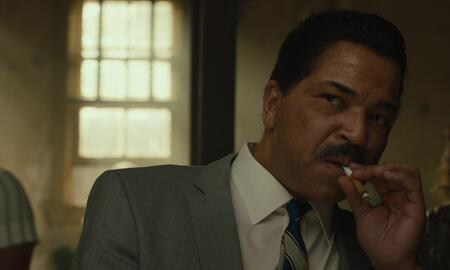
Just when the NAACP is finally on board, Clayton Powell throws a another spanner into the works: again he blackmails the group with Rustin’s long severed Communist Party ties and a 10-year-old rap sheet for lewd conduct with two (adult) men. Wright plays Clayton Powell as a full-fledged villain, jealous of King’s power base in the South and defending tooth and nail his own in New York and D.C. His torpedoing of the 1960 protest is of public record, but didn’t find any mention of his backstabbing in 1963. On the contrary, while Clayton Powell’s long career ended amidst corruption scandals and he was always considered rather self-serving, he is credited for moving civil rights legislation forward and serving his Harlem constituency. This is one instance of the film playing somewhat fast and loose with facts – or fudging them into confusion.

Fortunately, this time, Clayton Powell’s blackmail attempt is thwarted and everyone rallies around Rustin as the guiding force of the march. The big day, August 28, 1963, comes. At first, local police estimates a crowd of 75 before the masses flood the Mall. Martin Luther King holds his legendary “I Have A Dream” speech before 250,000-300,000 people. It was the largest peaceful protest to date. Afterwards, the White House invites reps of the “Big 10” organizations (somewhat confusingly, the film earlier stated that the “Big Six” had mushroomed due to the participation of more unions, but historical records generally speak about the “Big Six”). Rustin contentedly stays in the background, helping to clean up the Mall.
After a final montage which somewhat awkwardly blends archive and staged footage, the standard biopic wrap-up titles add that comprehensive civil rights legislation was passed and signed into law in 1964 (by Kennedy’s successor Lyndon Johnson, a Texas Dixiecrat – conservative Southern Democrat – who nevertheless became more committed to civil rights than his slain predecessor was). That same year, King was awarded a Nobel Peace Prize. Rustin continued his advocacy work and in 1977 met his longtime companion with whom he remained together until Rustin’s death in 1987. In 2013, 50 years after the march, President Obama post-humously awarded the Presidential Medal of Freedom to Rustin.
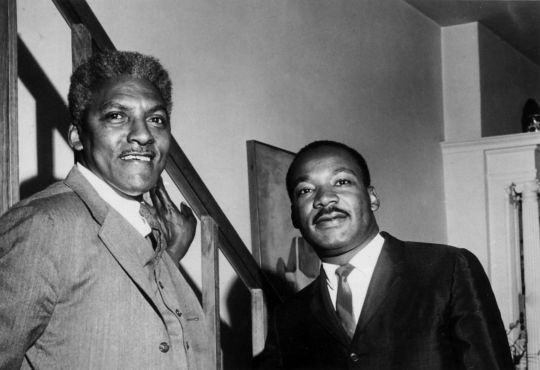
The titles don’t mention King’s increasingly vocal opposition to the Vietnam War and stronger demands for economic equality. And while King became somewhat more radical in the months before his asassination, Rustin was criticized for allegedly “selling out.” This meant cosying up to the Democratic party und big unions like the AFL-CIO, eschewing Black Power politics and later affirmative action (Rustin thought any form of “identity politics” was counterproductive as it could alienate necessary white allies) and adopting an anti-communist/anti-Soviet stance through his conditional support of the war (rollback of communism - yes, punitive military action against Vietnamese civilians - no). Contrary to his anti-communism, Rustin remained a lifelong socialist through his advocacy of social justice by wealth redistribution. And he was a gay rights activist until the end.

This aspect of Rustin’s life is brought to life through Colman Domingo’s compelling performance. He portrays Rustin as a self-confident, sexually attractive man who defies the homophobia of his era without ever becoming a victim. Rustin’s two key relationships, on the other hand, are not fleshed out. Tom stands by his man with little complaint when Rustin’s flirtations with other men become intense (Rustin admonishes Tom not to act like “Mrs. Rustin”). Tom is a more doormat-like version of Scott Smith (played by James Franco), the similarly long-suffering boyfriend of gay activist and later politician Harvey Milk in Gus Van Sant’s Milk – the screenplays for both films were written or co-written by Dustin Lance Black. As indicated in the film, when Rustin tells Tom he can’t allow himself to fall in love, but Tom will always be his family, the real-life Rustin and Tom Kahn remained friends and even co-authored an article about evolving protest into party politics. Rustin’s second significant relationship in the film was with the fictional Elias Taylor (Johnny Ramey), a NAACP lieutenant and married clergyman, groomed to take over his father-in-law’s congregation. After Elias helps to shoot down Rustin’s suggested march (the soon-to-be KKK murder victim Medger Evans is the only NAACP member who gets and supports it), he approaches Rustin in the men’s room. Elias flirts rather unabashedly; the two convene to a gay bar for drinks and begin an illicit affair. Elias is a mealy-mouthed cipher whose primary attraction for Rustin might be the challenge of converting him to the “cause.” The affair goes on long enough to piss off Tom but is cut short when Elias’ wife Claudia calls Rustin late at night to order him to call it off. The affair foregrounds Rustin’s free-spirited (in his mind) or promiscuous (other people’s judgement) lifestyle and serves the plot as it is Elias who suggests that Rustin reconcile with King for the sake of the movement.
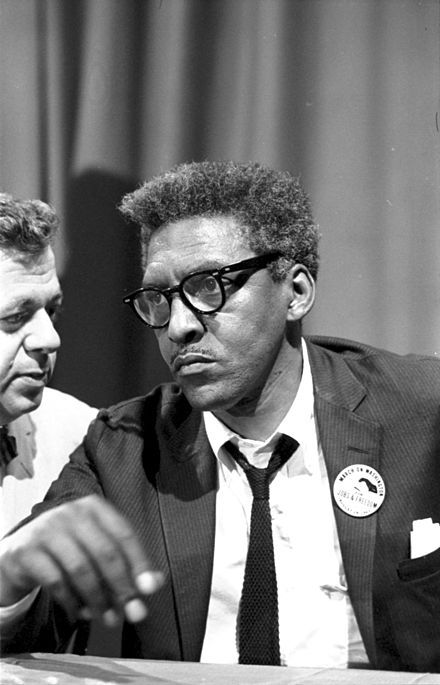
Rustin was not the most accomplished film of 2023 (one wonders how a more seasoned filmmaker like Ava DuVernay would have filmed the story; theater director George C. Wolfe has one other film, Ma Rainey’s Black Bottom under his belt). But it was arguably one of the most thought-provoking. Its images of political activism as a group effort and compelling, complex portrayal of an openly gay African American man in the 1960s whisk audiences back to pre-internet times when protest was organized with considerable effort but arguably had more impact than today’s online-driven activism. Nostalgic, cinematic comfort food or inspiration to counter myriad current injustices? In any case, if Bayard Rustin hadn’t actually existed, he would’ve needed to be invented.
********************************
Recommended: Brother Outsider: the Life of Bayard Rustin (2003), documentary by Nancy Kates and Bennett Singer. Here we see Rustin also speak at the Mall in August 1963, which for some reason the fiction film omits.
youtube
Update 1: Colman Domingo was nominated for the Best Actor - Drama Golden Globe (Cillian Murphy took home the award for his portrayal of J. Robert Oppenheimer in Christopher Nolan's eponymous biopic), BAFTA and Oscar. He is the first Afro-Latin actor and, along with Jodie Foster (Best Supporting Actress nominee for Nyad), the first out LBGTQIA* person to be nominated for playing an out LBGTQIA* role.
Update 2: American documentary filmmaker James Blue, a pioneer of participatory filmmaking with grassroots communities, directed this film about the March on Washington:
youtube
#bayard rustin#colman domingo#civil rights#film#cinema#movie#discrimination#lgbtqia#history#usa#Youtube
0 notes
Text
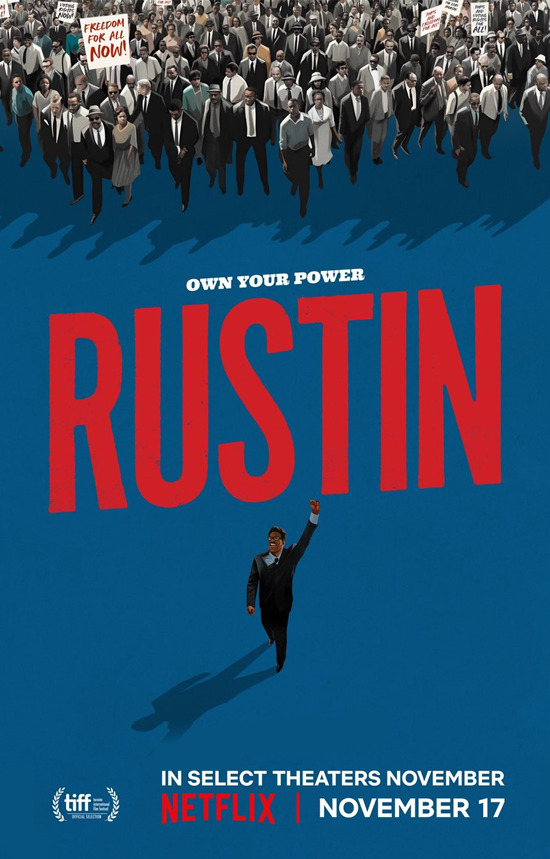
Rustin.
D: George C. Wolfe.
As Steven Spielberg’s Lincoln proved, one of the best ways to structure a biopic is to center it around a short but important period of time in its subjects life, but in Rustin, the story of a vital, though relatively obscure figure in the Civil Rights movement that approach becomes problematic. Bayard Rustin (Colman Domingo) was a central organizer in the movement who was a top adviser to Martin Luther King Jr (he introduced King to Ghandian non-violence tactics) but whose five-year membership in the Young Communist League (he left when the party abandoned non-violence) and open, though discreet, homosexuality made him vulnerable to attacks not only from racist politicians but also from moderate black leaders like Roger Wilkins (Chris Rock) and Adam Clayton Powell Jr. (Jeffrey Wright) who saw him as an increasing liability. The film finds him rudderless, estranged from King (Domingo’s face when King accepts what Rustin thought was a pro forma resignation is as good as acting gets) when he is asked by A. Philip Randolph to help organize a march for civil and economic rights that became the landmark March on Washington and the high point of Rustin’s life.
Wolfe, working from a script by Dustin Lance Black (who as he demonstrated in Milk, knows how to portray the minutiae of politics as both explicable and exciting) more than makes history come alive – aided by Tobias A. Schliesser’s vibrant cinematography, he gives it color – and Domingo gives a titanic performance as the Dynamo at the center of it all, but his story and that of the event take turns eclipsing each other (and Rustin’s affairs with a younger activist (Gus Halper) organizer and a married NAACP pastor (Johnny Ramey) are a melodramatic distraction from the main story). Rustin almost works as a depiction of history that rescues one of it’s heroes from obscurity. But finally, it can’t meld the man with the movement.
0 notes